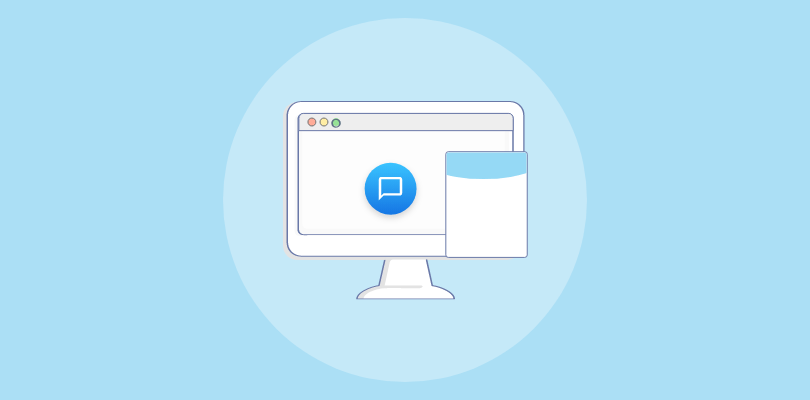Every year, live chat software companies come with new features for customer support, and that one question comes into play –
“What’s the best live chat software for this year?”
Now, before you get bamboozled with all the twenties and thirties of options search engines throw at you, I’m going to make things easy. Not twenty…not thirty – but I’ll compare the top 10 live chat software solutions that startups and SMBs should target this year. Here, have a first glance –
| Live Chat Software | Best For | Pricing Starts From |
|---|---|---|
| ProProfs Chat | 24/7 Delightful Customer Support With AI Chatbots | $19.99/operator/month Free Plan available. |
| LiveChat | Boosting Sales & Customer Engagement With Live Chat | $20/month |
| Tidio | Live Chat With Ticketing Functionality | $29/month |
| Drift | Conversational Landing Pages | $2500/month |
| Tawk.to | Free Live Chat With Basic Features, Good for Small Businesses | Free Forever |
| HubSpot | Converting Sales & Engaging Customers With Free Live Chat | $15/month/seat |
| Olark | Simple Chat Solution | $29/month |
| LiveAgent | Simple & Feature-Rich Live Chat With Gamification for Agent Motivation | $9/agent/month |
| Pure Chat | Entrepreneurs & Small Teams | $39/month |
| Intercom | Omnichannel Platform With Messenger & App | $39/seat/month |
Which is the Best Live Chat Software?
There are many things to consider before buying live chat software. Don’t have enough time to read the full comparison? Here are my top three choices from the list
- ProProfs Chat: A user-friendly live chat tool for startups and SMBs with powerful features to enhance customer support. It includes an AI chatbot to automate tasks and offers customization options for chat widgets and canned responses. Plus, co-browsing allows you to assist customers directly on their screens.
- HubSpot: Offers personalized conversations at scale. It integrates with their CRM for lead qualification and uses chatbots to answer FAQs and schedule meetings. It even connects with platforms like WhatsApp and Slack for wider reach. Good for existing users of the HubSpot ecosystem.
- Tawk.to: Offers free live chat for small businesses. It’s easy to set up, lets you track visitors, and provides video/voice chat options (paid add-on). Great for basic needs with collaboration tools and a knowledge base builder.
For a more detailed review, consider reading the full comparison below
List of the 10 Best Live Chat Software: REVIEWED
Some of you may ask – “How did you source and review all these tools?”
Well, I spent the last few months connecting with industry leaders (product managers, customer support managers, directors, etc.) to know which live chat software solutions they use. I also asked what their next software would be and why.
All that, along with a bit of personal experience with the tools and feedback from existing users from software review sites, contributed to this exhaustive review below.
Let’s get started.
1. ProProfs Chat
Best for 24/7 Delightful Customer Support With AI Chatbots
ProProfs Chat is one of the industry’s few tools with an easy-to-use interface without compromising features. Using it, you can expect to see a boost in your customer support and engagement efforts.
The software comes with an AI chatbot tool that has become an essential part of live chat platforms over the last few years. The chatbot automates responses and manages routine queries, saving time and ensuring a consistent user experience.
Besides third-party platforms, it tightly integrates with sibling tools – ProProfs Knowledge Base Software and ProProfs Help Desk, helping you provide 360° customer support.
From a customization perspective, you can tailor the chat widgets to canned responses to meet specific needs. The software also offers co-browsing, enabling you to assist operators by navigating their screens.
What you’ll like:
- Pre-chat form to collect visitor information before starting a chat session
- Chat routing to other agents or departments based on the visitor’s needs
- Chat ratings to get customer feedback on service quality
- Integration with eCommerce platforms like Wix, Shopify, Magento, and BigCommerce.
- Visitor tracking to track behavior, location, and referral source on your website
- Tracks qualified leads and compares with lead goals with Google Analytics integration
What you may not like:
- Free plan is only for a single operator
- Cloud-based software may not be the ideal choice for on-premise requirements
Pricing: A freemium plan is available for a single operator. Paid options start from $19.99/operator/month.
2. LiveChat
Best for Boosting Sales & Customer Engagement With Live Chat
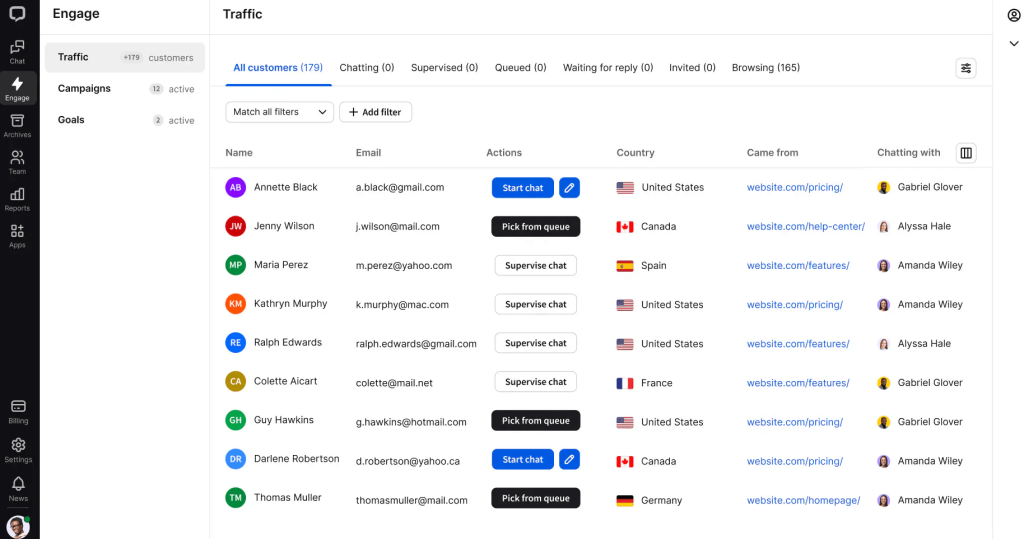
I used LiveChat briefly and was pretty satisfied with its functionality. One of the features that I liked the most about the software was its detailed reports that provided me with valuable insights about my website traffic and chat interactions.
I could see where my visitors come from, what pages they view, how long they stay, and how they engage with my agents and bots. You can also measure and improve chat performance with reports and chatbot ratings.
The software’s chatbots can answer common questions, collect leads, and automate tasks. I believe it’s one of those live chat apps that can help you boost customer engagement and improve sales.
What you’ll like:
- In-chat voice, video, and screen-sharing to communicate with visitors
- Knowledge base for customer self-service options by linking with a FAQ page
- Message sneak peek to see what visitors are typing before they send their messages
- Quick, text-based solutions during chats to reduce the workload on customer support teams
- Rich messages to enhance chat conversations with images, videos, cards, and buttons
What you may not like:
- Occasional glitches, such as freezing chat window or messages not being sent
- Limited customization options for the chat widget
Pricing: Starts from $20/month.
Read Also: Top 13 LiveChat Alternatives in 2026
3. Tidio
Best for Live Chat With Ticketing Functionality
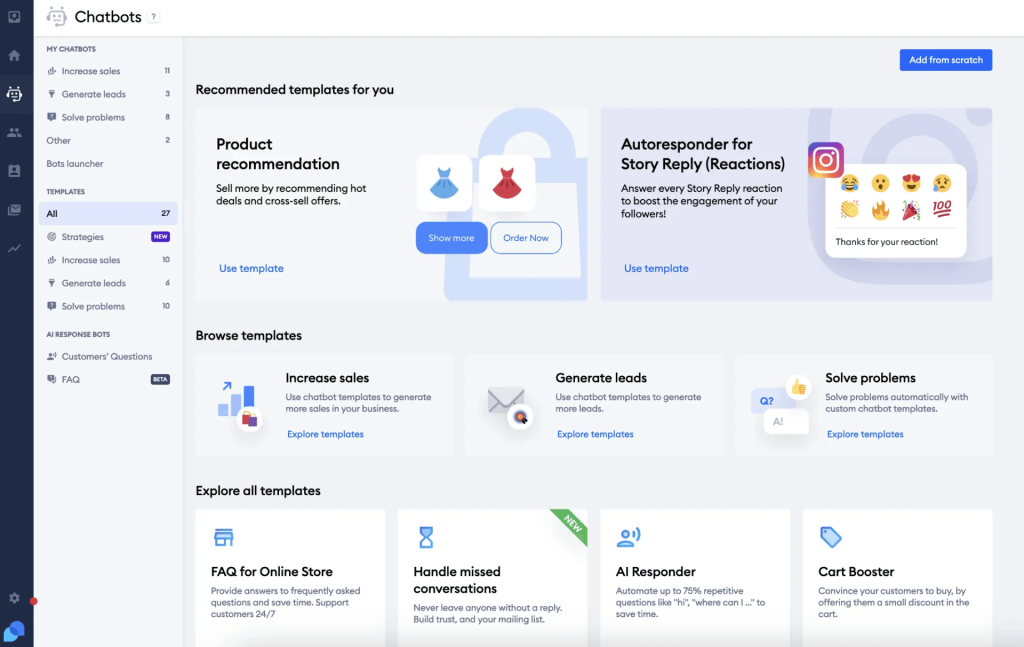
A close industry peer of mine uses Tidio for customer service and sales on their online store.
I’ve heard the software was easy to install and customize to match their brand’s personality. The software helps them manage all communication channels in one place, including live chat, email, WhatsApp, Messenger, and Instagram. What surprised me is that it even comes with a ticketing functionality!
You will find a lot of chatbot templates that can be used to reduce cart abandonment. Users can set up automated greetings, product recommendations, and discounts for new and returning visitors.
What you’ll like:
- Multilingual support to cater to a global audience
- Collects emails when offline, ensuring no chat goes unanswered
- An intuitive, no-code automation builder that allows for easy automation of conversations and sales
- Real-time visibility of website visitors and their browsing pages
- Chat history to access and search customers’ previous chat conversations
What you may not like:
- Some users have found Tidio’s setup process to be complex
- No visitor info, automatic chat assignment, or advanced analytics in the free plan
Pricing: A free plan is available for up to 50 conversations. Paid options start from $29/month.
Explore: Top 11 Tidio Live Chat Alternatives & Competitors
4. Drift
Best for Conversational Landing Pages
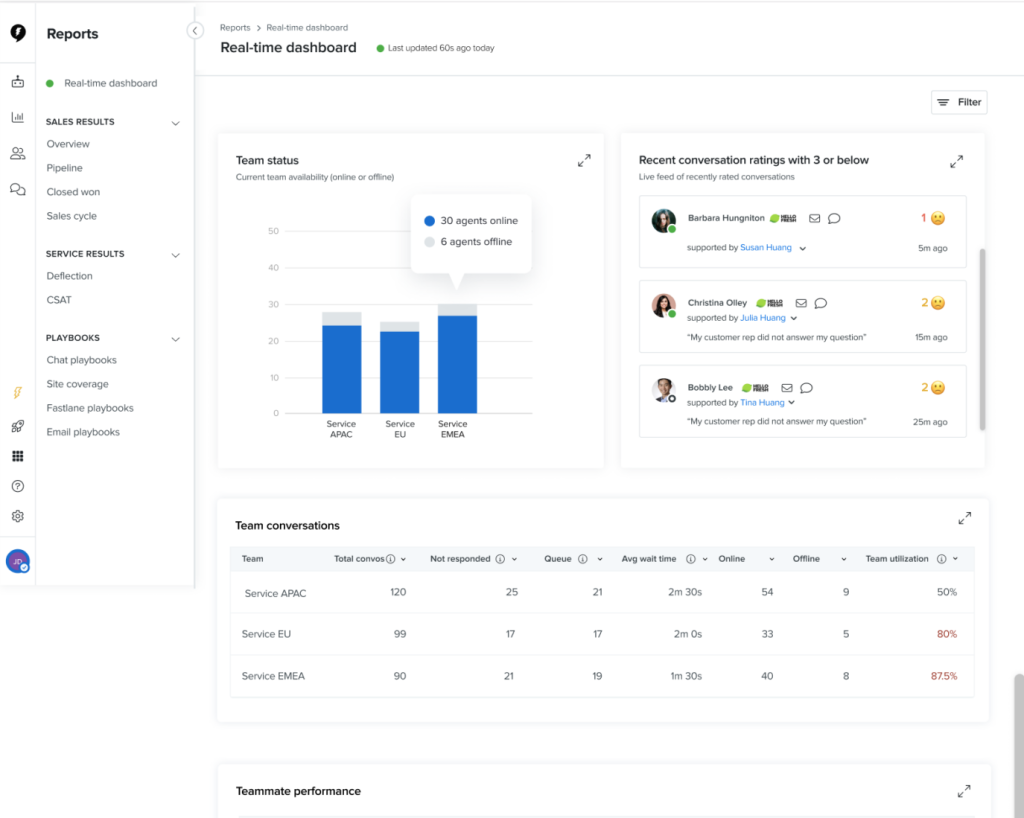
Drift impressed me by how it helps in connecting with visitors and generate more leads. Its live chat software is powered by AI, which means it can automatically listen, understand, and learn from buyers to create personalized experiences.
One of the features I liked the most was the conversational landing pages. It allows you to start real-time conversations with visitors and guide them to what they are looking for.
The software also notifies you when one of your target accounts visits the website so you can chat and book meetings. I think it’s good software as long as you have the budget to afford it.
What you’ll like:
- Shortens the sales cycle with real-time conversations, allowing immediate engagement
- Multiple inboxes to manage different types of conversations, such as support or sales
- Built-in video tool to share videos with prospects via chat or email
- Enables personalized conversations at every stage of the buyer’s journey
- Detailed insights to analyze and optimize chat performance and revenue impact
What you may not like:
- Pricing may not be suitable for small or medium-sized businesses
- Primarily designed for businesses that use a bot-driven sales model, it may not be suitable for all businesses
Pricing: Starts at $2500/month.
Read Now: 11 Best Drift Alternatives for Your Business in 2026
5. Tawk.to
Best for Free Live Chat With Basic Features, Good for Small Businesses
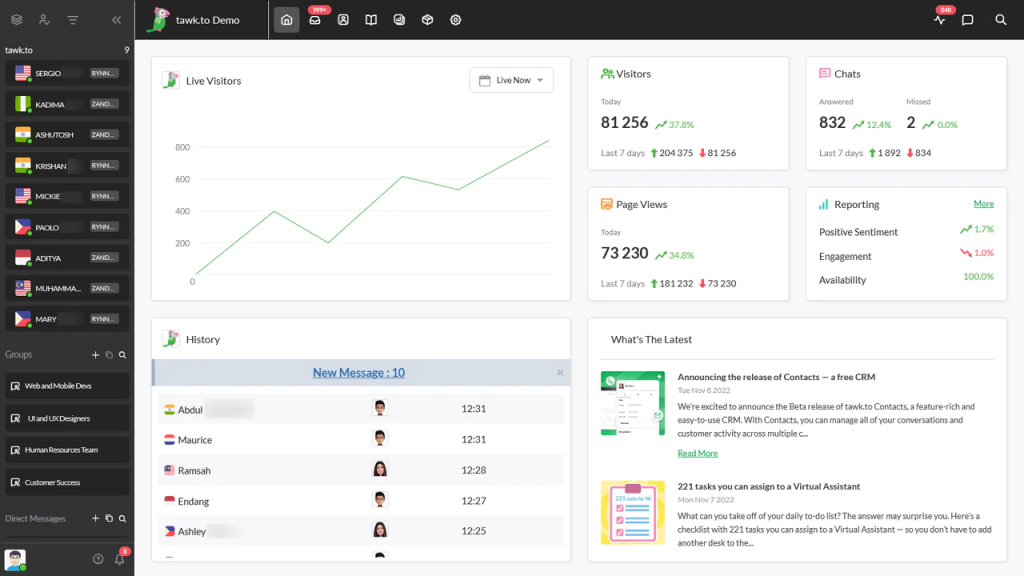
Tawk.to is a free live chat software for small businesses. It has a simple and easy setup; you just need to copy and paste a line of JavaScript code to your website to get started. You can also monitor customer activity, track their journey, and localize messages in your language.
One of the features I like is its video and voice add-on, which lets you chat with customers via video or voice calls. You can also collaborate with team members, share files and screens, and create a knowledge base to help customers.
In my experience, it’s a basic live chat software that doesn’t cost anything unless you want to remove branding or hire their agent for customer support.
What you’ll like:
- Ticketing system to manage and track customer requests
- Block/unblock visitors from chatting based on their IP address or other criteria
- Fully customizable chat widgets that can be tailored to match your brand’s look and feel
- File upload to allow visitors and agents to share files during chat sessions
- Triggers to set up automatic messages or actions based on visitor behavior and conditions
What you may not like:
- Long wait times and unhelpful responses from the customer support team
- Limited customization options for the chat widget
Pricing: Free forever.
Read Also: 11 Best Tawk.to Alternatives for Improved Customer Service in 2026
6. HubSpot
Best for Converting Sales & Engaging Customers With Free Live Chat
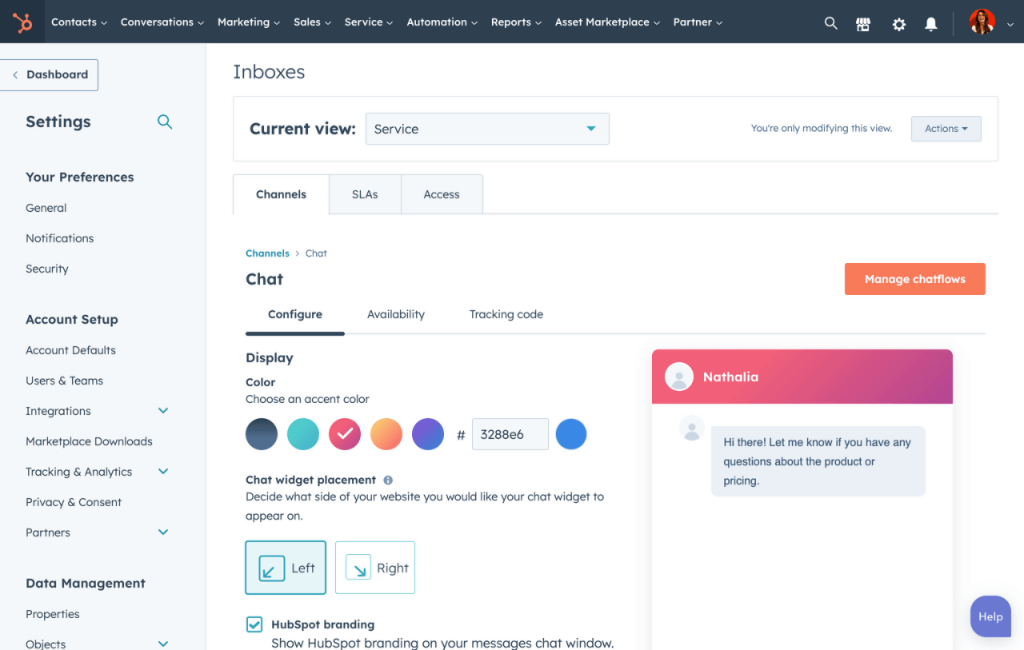
Having utilized HubSpot‘s live chat software, I can say it’s pretty good at facilitating personalized conversations with prospects and customers at scale.
So, what makes it one of the best live chat software for businesses? First, if you use HubsSpot’s ecosystem of tools, this one will be a good addition. The integration with HubSpot CRM and the inclusion of AI-driven chatbots can prove invaluable for qualifying leads, scheduling meetings, and addressing frequently asked questions.
I found the live chat feature particularly advantageous for connecting with visitors across various platforms such as WhatsApp and Slack.
What you’ll like:
- Workflows to automate chat tasks and actions with workflows
- Chat routing based on agent availability, skills, or other criteria
- Chat transcripts to save and export conversations for future reference or analysis
- Reports to measure and improve chat performance and customer satisfaction
- Chatbot creation with zero coding knowledge
What you may not like:
- Limited integration with third-party software
- Not the easiest learning curve you’ll find in live chat software
Pricing: A free plan is available for up to 5 users. Paid options start from $15/month/seat.
Explore: 10 Best HubSpot Chat Alternatives to Boost Your Engagement in 2026
7. Olark
Best for Simple Chat Solution
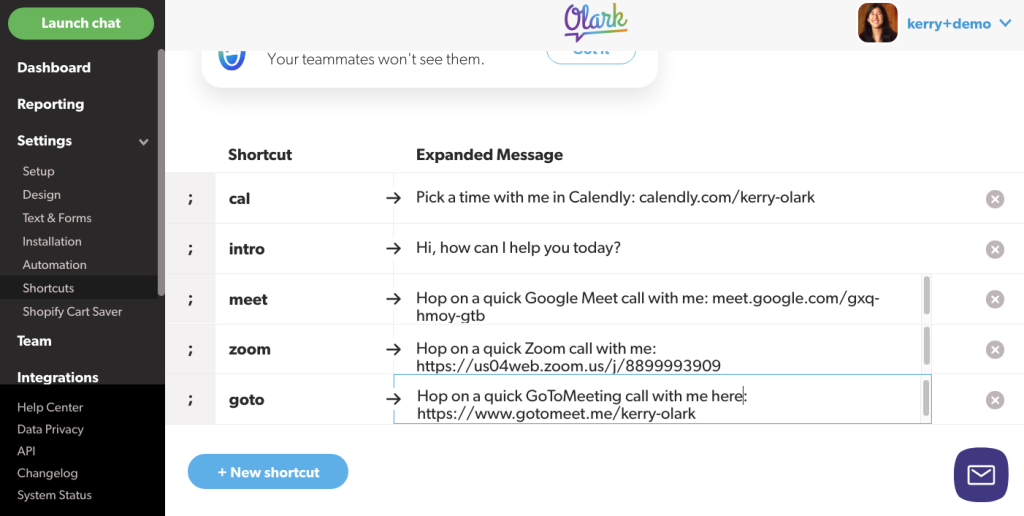
I checked Olark’s live chat software and think connecting with website visitors and providing instant support is pretty good.
Installing and customizing the chat box to match is very simple. The software lets you send automated messages to greet customers, offer help, and collect feedback. I like that it shows real-time data on chat volume, customer satisfaction, and agent activity. Plus, you also get email reports on team performance.
One of the best features of Olark was its stored transcripts. This can help you uncover valuable insights from customer conversations. The software offers power-ups to enhance the chat experience with features like co-browsing, chat translation, and CRM integration.
What you’ll like:
- Targeted messages to visitors based on their behavior, location, or page URL
- Chat limits to control the number of chats that each agent can handle at a time
- Customization features with quick visual tweaks for a stylishly on-brand chat box
- Easy-to-configure live chat automation rules to engage more customers and speed up workflow
- Monitors chat volume, customer satisfaction, and agent activity with detailed real-time live chat reports
What you may not like:
- Limited reporting capabilities as compared to other live chat apps
- Does not have a native mobile app
Pricing: Starts at $29/month.
Must Read: Best Olark Alternatives: 10 Competitors to Consider in 2026
8. LiveAgent
Best for Simple & Feature-Rich Live Chat With Gamification for Agent Motivation
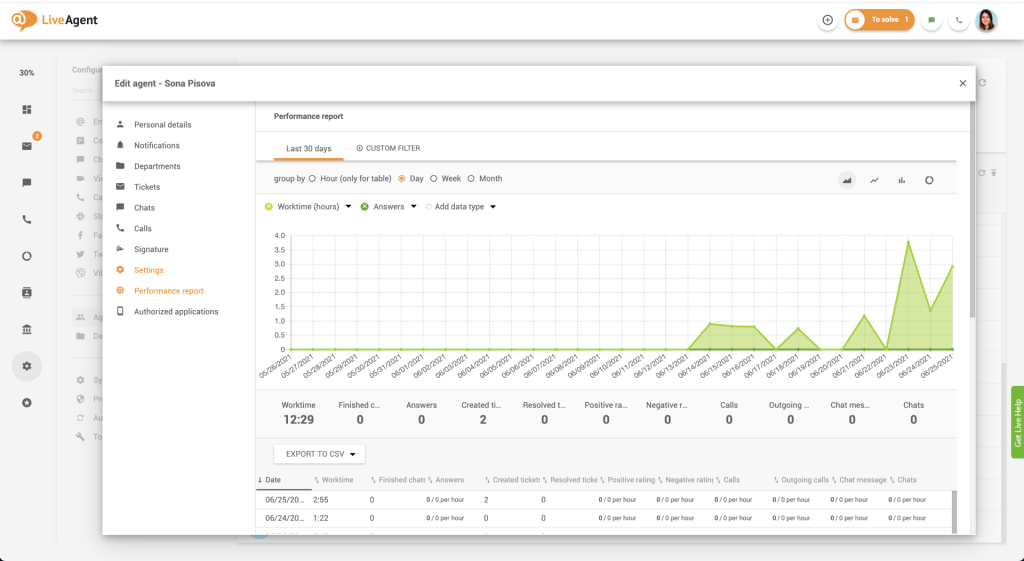
LiveAgent can be one of the best live chat apps if you want gamification elements to motivate agents. In my usage, I feel it’s more than a chat tool but a complete customer service platform.
Its fast and reliable chat widget can be customized and placed on any website. The software comes packed with a ticketing system that helps organize and manage all customer inquiries from different sources.
One of the best features I liked was the proactive chat invitations, which allow an agent to initiate conversations with website visitors and increase conversions.
What you’ll like:
- APIs to customize and extend chat functionality
- Chat button that can be placed anywhere on the website
- Chat overview to monitor and manage all chat sessions in one place
- Chat distribution among agents or based on their workload or skill level
- Lots of customization options with changeable chat buttons, animations, positions, etc.
What you may not like:
- No transparency on what feature limitations are in the free plan unless you sign up
- Some users feel the tool can be challenging to scale up as the business grows
Pricing: A free plan is available with limited features (undisclosed). Paid options start from $9/agent/month.
Read Now: 10 Best LiveAgent Alternatives to Enhance Customer Support 2026
9. Pure Chat
Best for Entrepreneurs & Small Teams
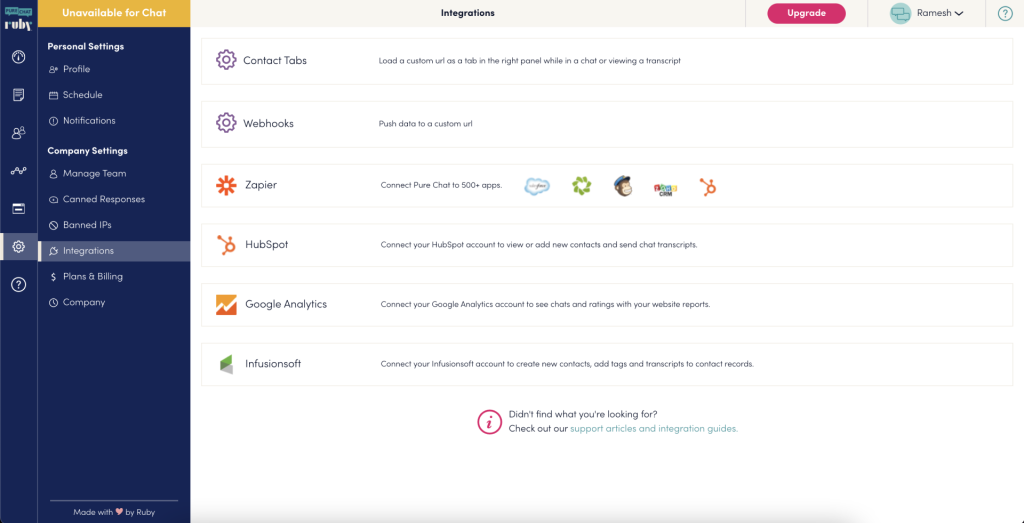
Looking for one of the best live chat software for websites? Pure Chat can be a good contender.
You can easily connect with website visitors and turn them into customers. You can also access the powerful dashboard to manage chats, view analytics, and integrate with existing tools you use.
However, in my opinion, one of the best features of Pure Chat is the mobile app. It lets you chat with visitors from your phone, wherever you are. You can also access chat history, use canned responses, and manage security roles.
I think it’s a decent tool to improve customer service, increase sales, and grow business – especially for small teams.
What you’ll like:
- Monitors visitor behavior and gains insights to improve engagement and sales
- Chat export to CSV or PDF files for backup or analysis
- Chat notifications via email, SMS, or desktop notifications
- Trigger-based chat functionality to automatically initiate chats based on visitor actions to capture leads
- Chat rescue to recover lost chats and messages in case of internet connection issues or browser crashes
What you may not like:
- No white labeling is available in the starter plan
- A lot of users report having low and unresponsive customer support
Pricing: Starts at $39/month.
Read: 10 Best Pure Chat Alternatives in 2026
10. Intercom
Best Omnichannel Platform With Messenger & App
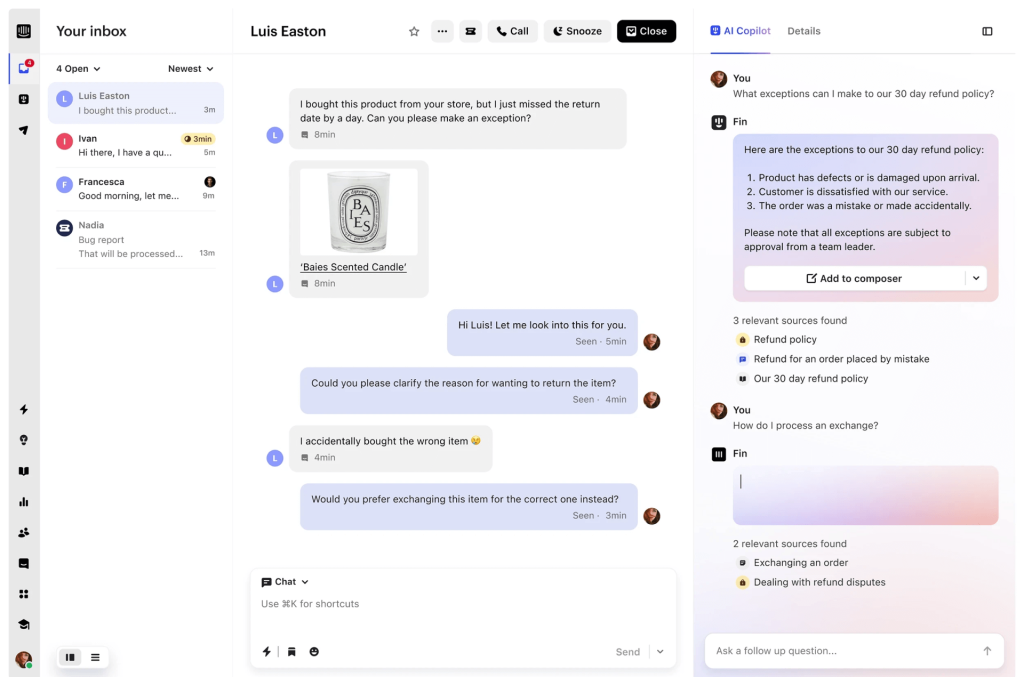
Intercom is one of the best live chat software on the market today. It lets you connect with website visitors and provide them with personalized and timely support. But that’s not anything new, right?
One of the features I like the most is the AI chatbot ‘Fin.’ It plays a big role in reducing support volume and increasing team efficiency. Using it, you can answer common questions, collect feedback, and qualify leads automatically without human intervention.
The software also integrates with other tools, such as email, help center, and reporting. Overall, it’s a decent omnichannel live chat tool, but the pricing can be slightly over budget for some startups or small businesses.
What you’ll like:
- Proactive customer support options through automation and AI
- Self-serve options to direct customers to knowledge bases and automated responses
- Inbox management to manage conversations and help multiple customers at once
- Operator settings to automate customer interactions and route conversations
- Customizable live chat to align with your brand and manage button visibility
What you may not like:
- Intercom is a premium-priced tool, which may not be affordable for all businesses
- A steep learning curve for new users
Pricing: Starts at $39/seat/month.
Also Check: 11 Best Intercom Alternatives & Competitors [REVIEWED]
Evaluation Criteria
The evaluation of products or tools chosen for this article follows an unbiased, systematic approach that ensures a fair, insightful, and well-rounded review. This method employs six key factors:
- User Reviews / Ratings: Direct experiences from users, including ratings and feedback from reputable sites, provide a ground-level perspective. This feedback is critical in understanding overall satisfaction and potential problems.
- Essential Features & Functionality: The value of a product is ascertained by its core features and overall functionality. Through an in-depth exploration of these aspects, the practical usefulness and effectiveness of the tools are carefully evaluated.
- Ease of Use: The user-friendliness of a product or service is assessed, focusing on the design, interface, and navigation. This ensures a positive experience for users of all levels of expertise.
- Customer Support: The quality of customer support is examined, taking into account its efficiency and how well it supports users in different phases – setting up, addressing concerns, and resolving operational issues.
- Value for Money: Value for money is evaluated by comparing the quality, performance, and features. The goal is to help the reader understand whether they would be getting their money’s worth.
- Personal Experience / Expert’s Opinion: This part of the evaluation criteria draws insightful observations from the personal experience of the writer and the opinions of industry experts.
Live Chat Software Buyer’s Guide
Now that you have a surefire idea about what different tools you can try for customer support and engagement, it’s time to take a step ahead. In the following section, I will guide you through a detailed analysis of what considerations you can make when choosing the best live chat software.
Let’s get started.
What Is Live Chat Software?
Live chat software allows businesses to communicate with website visitors and customers in real time through a chat window. It’s basically an instant messaging system for businesses to provide customer support, engage customers, answer questions, and close sales.
To have a visual understanding of live chat software, watch this video –
What are the Top Use Cases of Live Chat Software?
Live chat software has become a versatile tool for businesses today. It plays a crucial role in customer interaction and operational efficiency. Here are some of the top use cases of live chat software, reflecting its diverse applications across various business functions –
- Customer Support: The primary use of live chat is instant customer support. Users can get answers to their questions in real time, faster than email, and more convenient than phone calls.
- Sales Assistance: Live chat boosts sales by providing shoppers with immediate assistance. Agents can offer recommendations, help with navigation, and address purchase queries on the spot – increasing the likelihood of conversion.
- Lead Generation: You can capture information and generate leads when agents are unavailable by engaging visitors through chatbots (a live chat tool).
- Feedback Collection: Live chat is an effective tool for gathering immediate user feedback about their website experience or recent purchases.
- Technical Support: For products or services requiring technical assistance, live chat directly solves problems – effectively cutting down unnecessary email or phone support delays.
- Order Management and Tracking: Using a chatbot tool of a live chat platform, you can help customers with inquiries about order status, shipment tracking, and delivery times.
Who Uses Live Chat Software?
Live chat software is widely adopted across multiple industries, each leveraging its capabilities to enhance customer engagement, streamline support, and boost sales. Here are some of the most common industries that use live chat and chatbots –
- eCommerce and Retail: Online stores use live chat to assist customers during shopping, helping with product questions, purchase decisions, and checkout processes.
- Healthcare: Medical providers and health clinics use live chat and chatbots to schedule appointments, provide patient support, and even handle sensitive inquiries with required confidentiality and care.
- Travel and Hospitality: This sector uses live chat to help customers with bookings, travel plans, cancellations, and customer service before, during, and after their travel.
- Real Estate: Real estate websites integrate live chat to quickly respond to listing inquiries, schedule viewings, and provide information about properties.
- Automotive: Car dealerships and automotive service providers use live chat to book appointments, provide details on models, and offer after-sales support.
- Education: The benefits of live chat for educational websites are wide-ranging. Educational institutions and eLearning platforms use live chat to interact with students, answer enrollment queries, and provide technical support for online learning tools.
What are the Different Types of Live Chat Tools?
Live chat tools are usually of two different types –
- Agent-Based Live Chat: Here, customers connect with human operators through the chat window for personalized assistance. This is ideal for complex inquiries or situations requiring in-depth knowledge.
- Chatbots: There are many Free AI Chatbots that can answer frequently asked questions, provide basic troubleshooting steps, or guide customers through self-service options. This can free up agent resources for more complex issues.
What are the Top 5 Features of Live Chat Tools?
Live chat software solutions come with plenty of features that help you engage customers and provide assistance to them when needed. Let’s quickly view the top five features.
- Chatbots: AI-powered tools that automate responses to common inquiries, freeing up operators for more complex issues. Chatbots can guide users, answer FAQs, and even assist with transactions.
- Real-Time Messaging: Enables immediate communication between operators and customers, reducing wait times and enhancing the customer experience through instant support.
- Proactive Chat Invitations: Sends automatic messages based on user behavior, such as spending time on a product page, to engage visitors and potentially increase conversions.
- Canned Responses: Predefined answers to common questions allow for quick and consistent communication, helping maintain efficiency during peak times.
- Chat Routing: Directs chats to the most appropriate human operators based on factors like query complexity or customer history, ensuring efficient and personalized customer service.
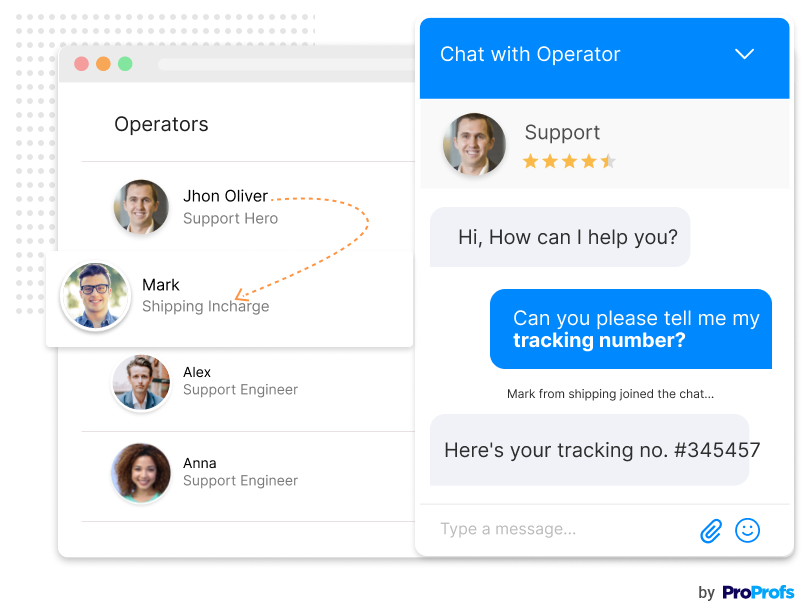
What are the Top 5 Benefits of Live Chat Tools?
The best live chat apps offer a multitude of advantages for businesses, significantly impacting customer experience, sales, and overall operational efficiency. Here’s a closer look at the top 5 benefits –
- Happier Customers, Stronger Loyalty: Live chat allows you to address customer concerns promptly, leading to faster issue resolution and a more positive overall experience. Satisfied customers are more likely to become loyal brand advocates.
- Boost Sales & Conversions: With live chat, you can answer product questions in real time, clear purchase hurdles, and guide customers through the buying process. This can significantly increase conversion rates and boost sales.
- Cost-Effective Support: Live chat can be a more cost-effective way to handle customer inquiries than traditional methods like phone calls. You can manage multiple chats simultaneously, reducing wait times and streamlining support processes.
- Capture Valuable Leads: Live chat interactions present a golden opportunity to gather valuable customer information, such as email addresses or phone numbers. You can later nurture potential customers and convert them into paying ones.
- Always-On Availability: Using chatbots, you can operate 24/7, regardless of business hours. This ensures consistent support for your global audience, even outside your operating timeframe.
Read more: 12 Benefits of Using a Live Chat on Website (Expert Advice)
How to Choose the Right Live Chat Software for Your Business?
Selecting the optimal live chat solution requires careful consideration of your specific needs. Here’s a quick roadmap to guide you –
Step 1: Identify Your Needs
Analyze your customer interactions and support requirements. Do you need an operator-based chat, chatbots, or a combination of both?
For example, a software solution like ProProfs Chat offers a combination of operator-based live chat and AI chatbots.
Step 2: The Budget Factor
Live chat software pricing varies depending on features, operator seats, and support options. Determine your budget allocation for this tool. If you’re about to try a live chat platform for the first time, I suggest looking for a vendor that offers a free trial or a free plan.
You can take ProProfs Chat’s example. The company offers a free plan for a single operator with all paid features. It’s great for small teams or for beginners.
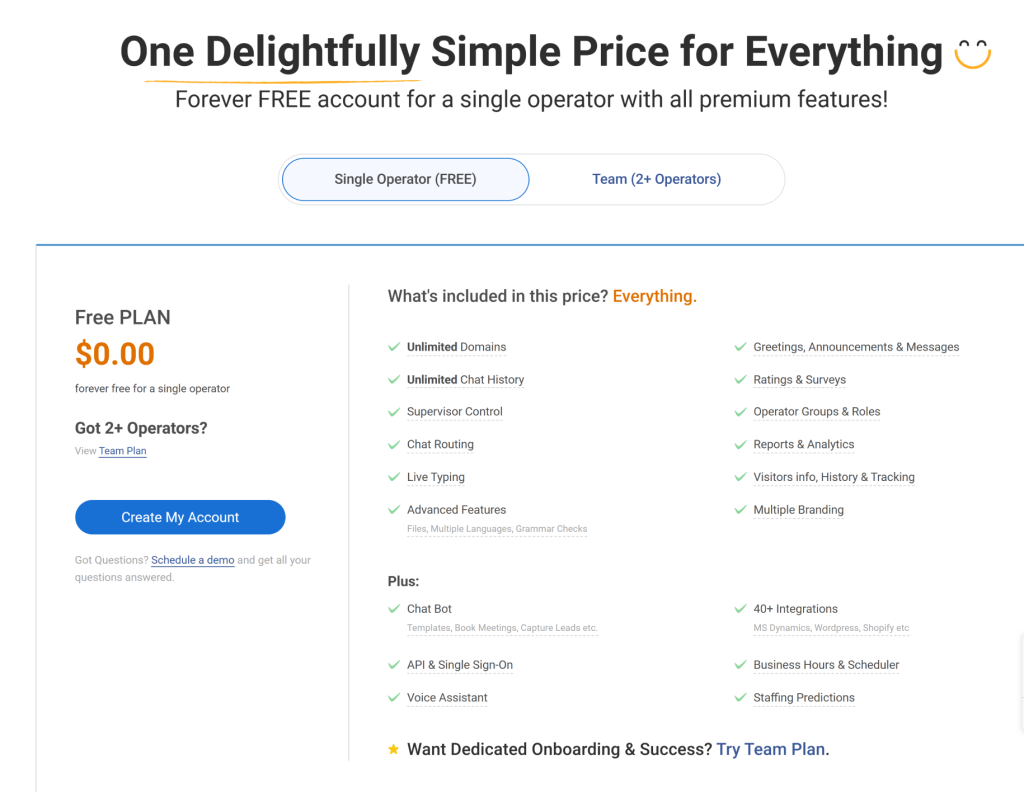
Step 3: Check Integrations
Ensure the live chat software integrates seamlessly with your existing CRM, helpdesk, or marketing automation tools.
For example, ProProfs Chat works effortlessly with ProProfs Help Desk, ProProfs Knowledge Base, and other suites of products.
Step 4: Check User Feedback
Before choosing a live chat tool, always remember to check how existing customers feel about it. The best way would be to check software review sites for user feedback, client testimonials, and case studies.
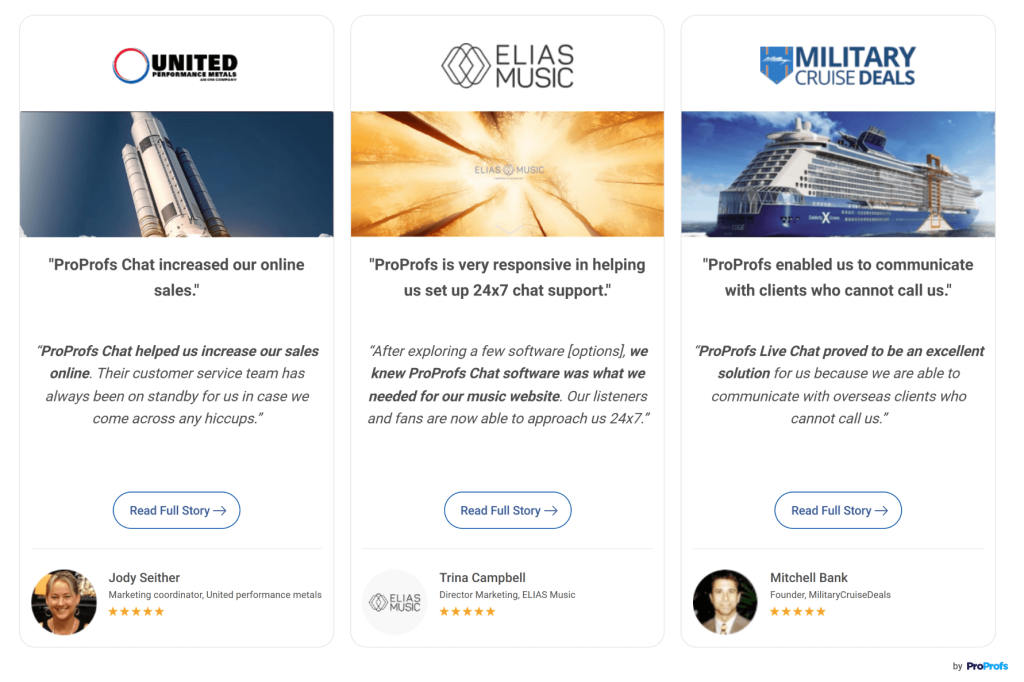
Step 5: Security
Prioritize data security and compliance with relevant regulations to protect sensitive customer information. Ask the company to provide details of their privacy and security measures for their clients and customers.
Pricing Structures & Budget Considerations for Live Chat Software
Live chat software pricing models come in various flavors, each catering to different business needs and budgets. Here’s a breakdown of the most common pricing structures to help you navigate the options –
- Per Agent Model: This is a straightforward approach where you pay a fixed monthly fee for each operator (agent) who will be using the live chat software. This plan is ideal for businesses with a predictable number of support agents.
- Per User Model: In this model, you pay a set fee per user who has access to the live chat features. This might be relevant for companies with multiple departments utilizing the chat functionality, not just the dedicated support team.
- Tiered Pricing: Software vendors often offer tiered pricing plans with varying feature sets. Basic plans typically include core functionalities like chat windows and canned responses. Higher tiers unlock additional features like advanced analytics, chatbot integrations, and priority support. Choose a tier that aligns with your specific feature requirements.
- Pay-Per-Chat Model: This less common model charges a fee based on the number of chat interactions you have during a billing period. This can be suitable for businesses with fluctuating customer support volumes.
Before diving into pricing, ensure you clearly understand your essential features and functionality requirements. This will help you avoid paying for features you won’t use.
A good suggestion would be to consider the upfront monthly fee and potential additional costs like setup charges, data storage fees, or per-agent pricing increases as your team grows.
What Are Some of the Live Chat Software Trends to Look For?
The live chat software landscape is constantly evolving. Here are some key trends to watch for this year –
- Rise of AI-powered Chatbots: Chatbots with advanced artificial intelligence capabilities will offer more natural and personalized customer interactions, handling complex inquiries and deflecting simple issues from live agents.
- Omnichannel Support: Live chat will integrate seamlessly with other communication channels like social media messaging and SMS, providing a unified customer service experience across platforms.
- Proactive Chat Engagement: Predictive analytics will empower businesses to proactively initiate live chat conversations with website visitors based on browsing behavior or purchase intent – potentially increasing sales and conversions.
- Focus on Security & Compliance: Data security and regulatory compliance will remain a top priority. Live chat software providers will offer robust security features to protect customer data.
Case Studies of Businesses Before & After Using Live Chat
Here are two case studies demonstrating the transformative impact of live chat software on businesses, improving customer interactions and driving sales growth.
Case Study 1: Horse Saddle Shop
- Before Live Chat Implementation: Horse Saddle Shop, a family-owned business since 1986, faced challenges in responding quickly to customer inquiries about saddle fitting.
While phone calls were the primary mode of communication, they noticed that a significant number of customers preferred an alternative method of communication.
- After Live Chat Implementation: The company started using ProProfs Chat to instantly connect with customers, leading to more engagement and, importantly, increased revenue.
The live chat tool became a preferred contact point, often leading to future communications and sales. The software’s automatic translation feature proved invaluable for international customers, breaking down language barriers and enhancing customer satisfaction.
Read the full story here.
Case Study 2: United Performance Metals
- Before Live Chat Implementation: United Performance Metals (UPM), which specializes in metals solutions, lacked a live chat service on its online platform. This gap meant they were missing out on a key communication channel to connect with prospects and manage multiple requests efficiently.
- After Live Chat Implementation: ProProfs Chat was chosen as UPM’s first live chat solution, enabling them to answer customer questions in real time. This immediate interaction capability led to an instant increase in online orders and sales.
The live chat tool provided a comprehensive and user-friendly solution enhancing UPM’s customer service experience.
Read the full story here.
FREE. All Features. FOREVER!
Try our Forever FREE account with all premium features!
Empower Your Customer Support Team With Live Chat Software
Live chat software is an indispensable tool for businesses today, especially when catering to the needs of busy customers. It aims to provide exceptional customer service and drive sales without making customers wait.
But choosing the right system involves careful consideration of business needs, customer expectations, and the latest trends in technology. I’ve provided a list of the 10 best tools for that in the blog.
Make sure to check what each software offers. Also, don’t forget to ask the vendors for a demo or try their free plan (or trial, if available) to test it first.
FREE. All Features. FOREVER!
Try our Forever FREE account with all premium features!

 We'd love your feedback!
We'd love your feedback!
 Thanks for your feedback!
Thanks for your feedback!





